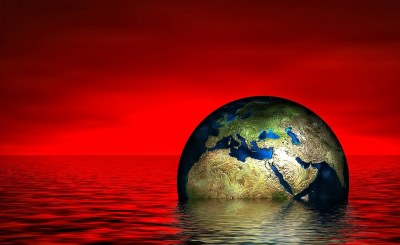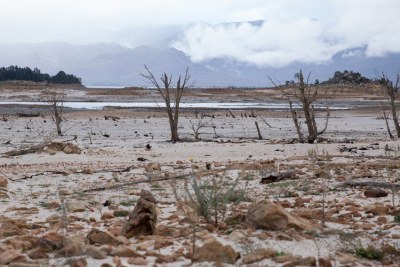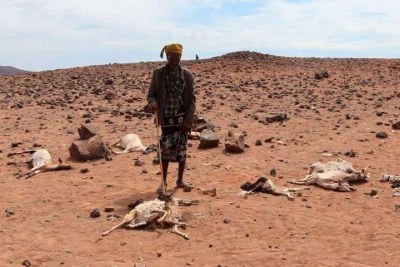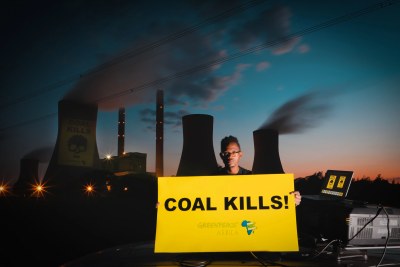-
South Africa: SA's Greenhouse Gas Emissions Increase by 10.4 Percent
SAnews.gov.za, 25 August 2021
South Africa's 7th National Greenhouse Gas (GHG) Inventory Report 2000 to 2017 shows that emissions have increased by 10.4% over the 17-year period. Read more »
-
South Africa: Top SA Climate Scientists Sceptical Humanity Can 'Geoengineer' Its Way Out of Climate Crisis
Daily Maverick, 18 August 2021
Whether it be flighting electrically charged drones to make it rain or releasing sulphur dioxides into the atmosphere to reflect sunlight, nations and non-state actors are… Read more »
-
South Africa: Climate Crisis - Decarbonising Window Will Close for Universities Like Wits If They Don't Lead the Way
Daily Maverick, 18 August 2021
Almost 200 universities, including Oxford, Cambridge, Soas and Yale, have divested from fossil fuels. On home soil, Wits would only be the third university thus far in low- and… Read more »
-
South Africa: IPCC's Latest Report On the Climate Crisis - Five 'Take-Home' Messages
Daily Maverick, 16 August 2021
The Intergovernmental Panel on Climate Change (IPCC) Assessment Report Six Working Group I report was released last week and has been described as a 'code red' for humanity. The… Read more »
-
South Africa: Water Resilience - Aquifer and Groundwater Recharge Solutions Are Essential to Building Future Security
Daily Maverick, 11 August 2021
As the climate crisis bites, water security becomes ever more critical. Redirecting and storing excess surface water through artificial recharge or Managed Aquifer Recharge --… Read more »
-
South Africa: Environmental Affairs Welcomes 6th IPCC Assessment On Climate Change
Govt of SA, 11 August 2021
"South Africa welcomes the long-awaited sixth assessment by the Intergovernmental Panel on Climate Change (IPCC). This is an important contribution to enhancing scientific… Read more »
Geoengineering Won't Fight Climate Crisis - South African Expert
On a globe already pockmarked by extreme weather events, and a mere .4°C away from the thresholds of "dangerous climate change", nations as well as non-state actors are increasingly looking to technology to pivot humanity from self-imposed disaster on to the path toward salvation. Scientists say, however, that while possible, there are immense political, economic, ecological, ethical and other societal considerations to be aware of when tinkering with global climate, writes Ethan Van Diemen for Daily Maverick.
Professor Bruce Hewitson, South Africa national research chair on climate change and director of the Climate System Analysis Group said that technological alternatives to either halt or reverse the heating of the planet, at a global scale, comprise what is referred to as "climate geoengineering". The University of Oxford defines geoengineering as "the deliberate large-scale intervention in the Earth's natural systems to counteract climate change".
Hewitson explained: "I'm deeply sceptical of geoengineering, not because it's not feasible, but because it has very dangerous potential consequences. I think it is very valid to do research on it so we understand geoengineering options better. So doing research to look at its limits and viabilities is very valid, but I am deeply sceptical that it will ever be a viable option."
Hewitson's comments come in the wake of the release of the sixth assessment by the Intergovernmental Panel on Climate Change. The report found that droughts will become more frequent at 1.5 °C of global warming, and more so as the level of global warming increases. The report also highlights and analyses the detail available in terms of climate change in southern Africa, reinforcing existing scientific evidence that the region is likely to become drier, and reductions in precipitation can already be detected.
InFocus
-
A recent assessment by climatologists at the Global Change Institute (GCI) at the University of the Witwatersrand indicates an increasing likelihood that taps in Gauteng province ... Read more »
-
A flagship United Nations science report says the average global temperature is likely to reach or cross the 1.5-degree Celsius warming threshold within the next 20 years, bri Read more »
-
The public utility which supplies the vast majority of South Africa's electricity, Eskom, is the biggest polluter on the continent, according to a local non-governmental ... Read more »
-
The amount of carbon dioxide that we can still emit while limiting global warming to a given target, is called the "remaining carbon budget," and it has become a powerful tool to ... Read more »
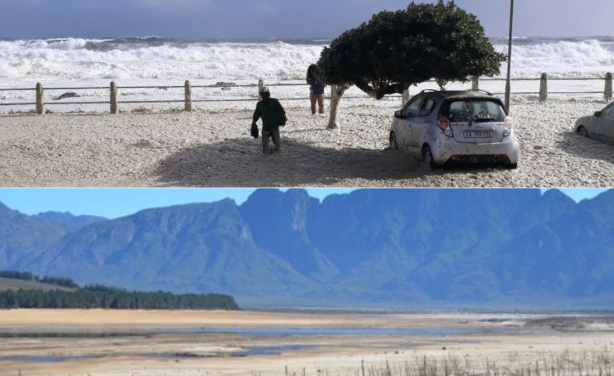
Top: Flooding in Sea Point, Cape Town in 2017 when a massive storm resulted caused by what was referred to as the #CapeStorm on social media. The heavy wind and rain resulted in eight deaths and damaged 135 schools across the Western Cape. Around 800 homes were flooded across the city of Cape Town due to the storm. Bottom: Theewaterkloof Dam during the height of the Cape water crisis in 2017. The Western Cape was declared a disaster area on May 22, due to drought in the province.
